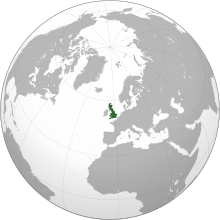
Back Groot-Brittanje AF Grossbritannien (Insel) ALS ታላቁ ብሪታን AM Bryten ANG ग्रेट ब्रिटेन ANP بريطانيا العظمى Arabic بريطانيا لعضيمة ARY بريطانيا العظمى ARZ Gran Bretaña AST Böyük Britaniya (ada) AZ
Other native names
| |
|---|---|
 | |
 | |
| Geography | |
| Location | North-western Europe |
| Coordinates | 54°N 2°W / 54°N 2°W |
| Archipelago | British Isles |
| Adjacent to | Atlantic Ocean |
| Area | 209,331 km2 (80,823 sq mi)[1] |
| Area rank | 9th |
| Highest elevation | 1,345 m (4413 ft) |
| Highest point | Ben Nevis, Lochaber, Scotland[2] |
| Administration | |
| Countries | |
| Largest city | London (pop. 8,878,892) |
| Demographics | |
| Population | 60,800,000 (2011 census)[3] |
| Population rank | 3rd |
| Pop. density | 302/km2 (782/sq mi) |
| Languages | |
| Ethnic groups | |
| Additional information | |
| Time zone | |
| • Summer (DST) | |
Great Britain (commonly shortened to Britain) is an island in the North Atlantic Ocean off the north-west coast of continental Europe, consisting of England, Scotland and Wales. With an area of 209,331 km2 (80,823 sq mi), it is the largest of the British Isles, the largest European island and the ninth-largest island in the world.[6][note 1] It is dominated by a maritime climate with narrow temperature differences between seasons. The island of Ireland, with an area 40 per cent that of Great Britain, is to the west—these islands, along with over 1,000 smaller surrounding islands and named substantial rocks, form the British Isles archipelago.[8]
Connected to mainland Europe until 9,000 years ago by a landbridge now known as Doggerland,[9] Great Britain has been inhabited by modern humans for around 30,000 years. In 2011, it had a population of about 61 million, making it the world's third-most-populous island after Java in Indonesia and Honshu in Japan,[10][11] and the most populated island outside of Asia.
The term "Great Britain" can also refer to the political territory of England, Scotland and Wales, which includes their offshore islands.[12] This territory and Northern Ireland constitute the United Kingdom.[13] The single Kingdom of Great Britain resulted from the 1707 Acts of Union between the kingdoms of England (which at the time incorporated Wales) and Scotland.
- ^ ISLAND DIRECTORY Archived 8 August 2017 at the Wayback Machine, United Nations Environment Programme. Retrieved 9 August 2015.
- ^ "Great Britain's tallest mountain is taller". Ordnance Survey Blog. 18 March 2016.
- ^ 2011 Census: Population Estimates for the United Kingdom. In the 2011 census, the population of England, Wales and Scotland was estimated to be approximately 61,370,000; comprising 60,800,000 on Great Britain, and 570,000 on other islands. Retrieved 23 January 2014
- ^ "Ethnic Group by Age in England and Wales". www.nomisweb.co.uk. Retrieved 2 February 2014.
- ^ "Ethnic groups, Scotland, 2001 and 2011" (PDF). www.scotlandscensus.gov.uk. Retrieved 2 February 2014.
- ^ "Islands by land area, United Nations Environment Programme". Islands.unep.ch. Archived from the original on 20 February 2018. Retrieved 24 February 2012.
- ^ "The Countries of the UK". Office of National Statistics. 6 April 2010. Archived from the original on 8 January 2016. Retrieved 5 July 2015.
- ^ "says 803 islands which have a distinguishable coastline on an Ordnance Survey map, and several thousand more exist which are too small to be shown as anything but a dot". Mapzone.ordnancesurvey.co.uk. Retrieved 24 February 2012.
- ^ Nora McGreevy. "Study Rewrites History of Ancient Land Bridge Between Britain and Europe". smithsonianmag.com. Smithsonian Magazine. Retrieved 25 April 2022.
- ^ "Population Estimates" (PDF). National Statistics Online. Newport, Wales: Office for National Statistics. 24 June 2010. Archived from the original (PDF) on 14 November 2010. Retrieved 24 September 2010.
- ^ See Geohive.com Country data Archived 21 September 2012 at the Wayback Machine; Japan Census of 2000; United Kingdom Census of 2001. The editors of List of islands by population appear to have used similar data from the relevant statistics bureaux and totalled up the various administrative districts that make up each island, and then done the same for less populous islands. An editor of this article has not repeated that work. Therefore this plausible and eminently reasonable ranking is posted as unsourced common knowledge.
- ^ "Who, What, Why: Why is it Team GB, not Team UK?". BBC News. 14 August 2016. Retrieved 6 August 2018.
- ^ Oliver, Clare (2003). Great Britain. Black Rabbit Books. p. 4. ISBN 978-1-58340-204-7.
Cite error: There are <ref group=note> tags on this page, but the references will not show without a {{reflist|group=note}} template (see the help page).